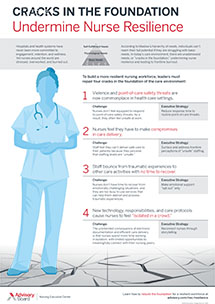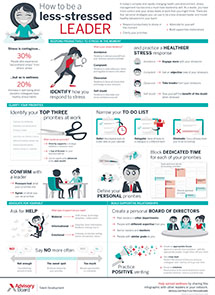Auto logout in seconds.
Continue LogoutEditor's note: This popular story from the Daily Briefing's archives was republished on Jun. 1, 2023.
While there's a lot of variation between individuals, there is some scientific evidence that humans may not always be good-natured, Christian Jarrett writes in British Psychological Society’s "Research Digest."
Cheat sheet series: Evidence-based medicine 101
He examines 10 psychological research findings that reveal the darker side of human nature.
1. Humans tend to dehumanize minorities and those who are vulnerable
Research has shown humans often see people of certain minority groups as being less than human, Jarrett writes. One brain scan study found that participants showed less neural activity "associated with thinking about people" when they looked at pictures of homeless individuals or drug misusers compared with people of a "higher status."
Similarly, another study found that people who are either opposed to Arab immigration or in favor of tougher counter-terrorism policy against Muslim extremists tend to view Arabs and Muslims as less evolved. Other research has found that young people tend to dehumanize older people, and that men and women both tend to dehumanize drunk women.
The pattern of dehumanization starts early too, Jarrett writes. He cites one study that found children as young as five years old viewed faces of people who live in another city or are another gender as less human than the faces of those within their own group.
2. Schadenfreude starts early
There's also "dispiriting" evidence that humans experience schadenfreude—deriving pleasure from another person's suffering—as early as age four, Jarrett writes. Another, more recent study found that children at six years old would rather pay money to watch an antisocial puppet get hit than use the money to buy stickers.
3. Humans tend to think that sufferers deserve their suffering
We tend to believe that the world is just, Jarrett writes. He cites a study, similar to now-famous research known as the Milgram study, in which a female was punished with electric shocks whenever she answered a question incorrectly. The researchers found that female participants were more likely to rate the female learner as less likable and admirable when they were told they'd see her be shocked again, especially if they felt they couldn't minimize the woman's suffering.
Other research has shown people tend to blame the poor, rape victims, AIDS patients, and others for their fate.
4. People tend to be close-minded
People are often dogmatic and hold strong to their beliefs, even when presented with evidence that contradicts them, Jarrett writes. One study published in 1967 found that participants who were strongly in favor of or against the death penalty ignored any facts that contradicted their view, and even doubled-down on their initial opinion.
Jarrett writes that humans often see facts that contradict their views as "undermining our sense of identity." Humans also tend to be overconfident about how well we understand things, and if we believe our opinion is better than someone else's, we tend not to seek out additional information, Jarrett writes.
5. People don't want to spend time in their own thoughts
For many people, spending time with their own thoughts is so unappealing, they'd rather be electrocuted, one 2014 study found. In the study, researchers discovered that 67% of male participants and 25% of female participants preferred to receive electric shocks rather than spend 15 minutes in contemplation.
Another study found people derived more enjoyment from doing an activity alone rather than just thinking.
6. People are overconfident and vain
Most people tend to have an inflated view of their attributes and abilities, Jarrett writes, and research has found that the least-skilled are often the most likely to be overly confident.
This vanity seems to exhibit itself most strongly in cases of morality, Jarrett writes. Research has even found that prisoners still believe themselves to be more kind, trustworthy, and honest than the average person outside of prison. Other research has shown that people often enjoy giving to charities that share our initials out of "implicit egotism."
7. People are often morally hypocritical
Not only are people overconfident about their morality, but they're prone to being morally hypocritical, Jarrett writes. One study found that participants rated the same selfish behavior as less fair when it was done by others than by themselves.
Similarly, other research has found that people tend to attribute others' bad behavior as character flaws while blaming our own bad behavior as being situationally influenced. More recent research has found people tend to view the same acts of rudeness more harshly when they're done by strangers rather than by ourselves or our friends.
8. Anyone can become an internet troll
"[S]ocial media may be magnifying some of the worst aspects of human nature," Jarrett writes, thanks to the ease of achieving anonymity online as well as a phenomenon called the online disinhibition effect.
And when it comes to online trolling, anyone could do it given the right circumstances, a study published last year found. Researchers in the study discovered that if a person is in a bad mood and is exposed to trolling by other people online, the likelihood that the person exposed to the trolling would engage in trolling increased twofold. These situational factors were actually more predictive of trolling than individual traits.
9. Psychopathic traits make for popular leaders
People tend to choose leaders who show psychopathic traits, Jarrett writes. For example, one survey of financial leaders in New York found that respondents often scored highly on psychopathic traits but below average on emotional intelligence. Similarly, a meta-analysis published this summer found a modest yet significant link between leadership emergence and psychopathic traits.
10. People are attracted to those with dark personality traits
Research has found that both men and women tend to be sexually attracted to people displaying what's referred to as the "dark triad" of traits—narcissism, psychopathy, and Machiavellianism.
Another study found that a women's physical attraction to a man increased when his description included being self-interested, manipulative, or insensitive, compared with when those three traits were excluded from his description (Jarrett, "Research Digest," British Psychological Society, 10/12).
Cheat sheet series: Evidence-based medicine 101
Been awhile since your last statistics class? It can be difficult to judge the quality of studies, the significance of data, or the importance of new findings when you don't know the basics.
Download our cheat sheets to get a quick, one-page refresher on some of the foundational components of evidence-based medicine.
Don't miss out on the latest Advisory Board insights
Create your free account to access 1 resource, including the latest research and webinars.
Want access without creating an account?
You have 1 free members-only resource remaining this month.
1 free members-only resources remaining
1 free members-only resources remaining
You've reached your limit of free insights
Become a member to access all of Advisory Board's resources, events, and experts
Never miss out on the latest innovative health care content tailored to you.
Benefits include:
You've reached your limit of free insights
Become a member to access all of Advisory Board's resources, events, and experts
Never miss out on the latest innovative health care content tailored to you.
Benefits include:
This content is available through your Curated Research partnership with Advisory Board. Click on ‘view this resource’ to read the full piece
Email ask@advisory.com to learn more
Click on ‘Become a Member’ to learn about the benefits of a Full-Access partnership with Advisory Board
Never miss out on the latest innovative health care content tailored to you.
Benefits Include:
This is for members only. Learn more.
Click on ‘Become a Member’ to learn about the benefits of a Full-Access partnership with Advisory Board
Never miss out on the latest innovative health care content tailored to you.


